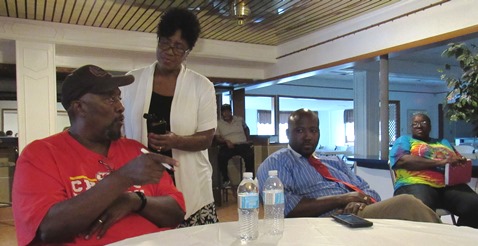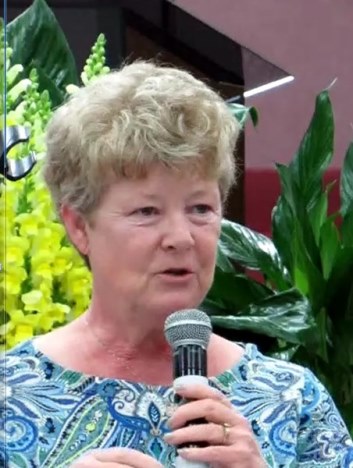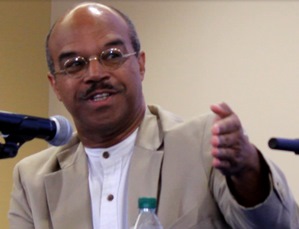Another community meeting scheduled tonight
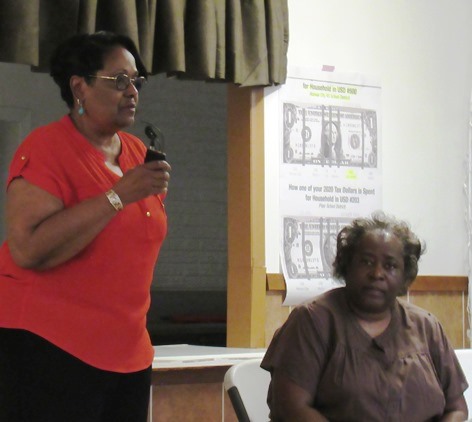
by Mary Rupert
An outside audit report is the continuing focus of some controversy at the Kansas City, Kansas, school board.
The audit and the reaction of some board members and candidates to it was one of the topics discussed at a community meeting sponsored by Unity with Purpose on Thursday, Aug. 29, at the former Manor House, at 5237 Parallel Parkway.
Another community meeting is scheduled at 6 p.m. Thursday, Sept. 12, at the same location by Unity with Purpose. This organization will be endorsing candidates in the election, according to Cardelia Walker, president.
She said the community meeting on Sept. 12 will discuss why some local qualified job candidates are not getting hired by the school district, including those qualified candidates who applied but never got an interview. Individuals who want to talk about their recruiting or hiring experiences with the school district but who cannot attend the meeting were given a dial-in number, 913-231-0091. Walker has been interested in the schools partly because of her job in real estate; last year Walker questioned the district’s expenditure of more than $600,000 for land for a new school.
With school board elections in November, the Aug. 29 community meeting was attended by several candidates running for the Kansas City, Kansas, school board, and other community members.
The school board approved an $84,000 outside audit last year of the administration’s compliance with board policies regarding human resources, hiring and pay for administrative positions. Corporate Integrity Systems was hired to do the audit.
The audit in essence found that superintendents, past and present, had complied with the board’s policies. However, the audit recommended revising the district’s policies. The policies allowed wide latitude by the superintendent to hire and recruit, according to the audit report. “The Board’s authority to govem KCKPS must be taken from the superintendent and given back to the Board,” the audit stated.
The school board then deadlocked, 3-3, on a motion to change the board’s human resources policies at the Aug. 27 board meeting. Board member Brenda Jones could not attend the meeting, and resigned from the board on Sept. 10 for reasons of health and having to move.
The audit report sparked a story in The Pitch that had questions about the audit, and there was another opinion expressed in The Call by Chester Owens, former city councilman, supporting the board members who had backed it.
Audit was undertaken because of residents’ complaints
At the Aug. 29 community meeting, Val Winn, the former board president of the school board, told the audience that they initiated the outside audit because board members kept getting calls from local residents who had applied for jobs at the district and could not get an interview, although they were qualified.
She explained that she asks a lot of questions at the board meetings, and she was trying to find the answers. Also appearing with Winn at the meeting was school board member Wanda Paige.
In the past, Winn, also a state legislator, has challenged policies at the state level that are possible examples of “institutional racism.”
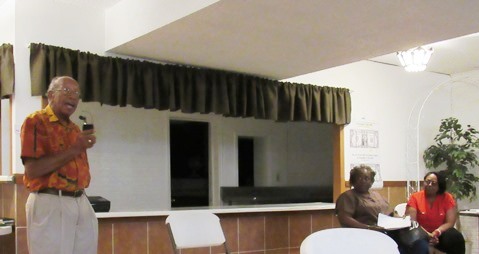
Owens: School board members have an ‘obligation’ to ask questions
At the Aug. 29 meeting, Chester Owens recalled talking with a school district superintendent in the 1960s who said, “You will never live long enough to see a Negro working in the administration.”
Owens’ letter to The Call stated, in part: “Board critics and district staff have been critical of the board’s interest in the internal workings of the district and the need for an audit. Recent articles critical of the board’s actions have been written by administration supporters. During the board approved audit, the superintendents and Board attorney refused to fully cooperate with the contractor and prolonged the completion of the audit. The reasons for resistance and criticism are becoming clear. The audit has revealed circumstances which clearly are not tied to the best interests of the students or community.”
His letter praised the activist school board members, saying that if board members vote on issues without full knowledge, they were being irresponsible.
“If the questions are not asked and compliance not assured, board members are a rubber stamp to whatever the administration does,” Owens wrote. “It is the obligation of board members to continuously assess what is going on in the district to assure that all actions taken by USD 500 are in the best interest of the students and the community. It is the obligation of the board to educate the community on what the audit report means and how the findings really impact our future. We must continue to support current board members in their effort to understand why our children are performing so poorly and realistically consider the long-term implications of being dead last in statewide student performance.”
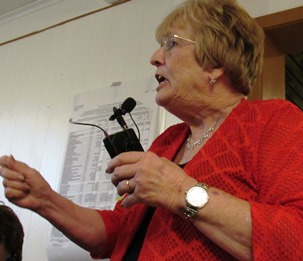
Micromanaging or rubber stamp?
There has been a continued debate at the school board about whether the board was “micromanaging” or if it was a more involved board, “not a rubber stamp board.”
Janet Waugh, who serves on the state Board of Education, 1st District, said she attended the Aug. 29 community meeting because she received a lot of phone calls about it and wanted to see what was going on. The school district is in her state board district.
Waugh said at the Aug. 29 meeting she and the state board will not be getting involved in the local district matters, as the district and community will have to resolve them without the state getting involved. She is a former Turner Board of Education member.
She also described her view of a school board member’s role as making policy but not deciding on all the details of how the district is run. The superintendent runs the district, selecting the details, while the board makes policies that the superintendent then implements, she said. As she understands the roles, if the board doesn’t like the way the district is run, it has the option to fire the superintendent, she added.
Waugh also praised the district’s teachers and said they are not paid enough.
Several other topics were discussed at the community meeting Aug. 29, including low student test scores. Some of the audience cited a high level of learning disabilities and a language barrier as factors.
The audit contains more detailed information and is online at https://kckps.org/wp-content/uploads/board/79C8047-Policy-Compliance-Audit-Findings-and-Recommendations-redacted.pdf.
